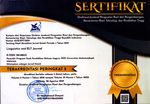Semantic Change Analysis on Film “the King’s Speech”
Abstract
Semantic Change is the meaning of a word can indeed change through its use in a metaphor, and it is often mentioned as one of the significant factors in semantic change. Based on the types of semantic change, they are divided into four types namely generalization, specialization, pejoration and amelioration. This research aims to analyze semantic change by characters on the film The King’s Speech written by David Seidler to find the types of semantic change by using qualitative research, and the data were collected through the film script especially from the characters in the film. Based on the findings of the study, the researcher found two semantic change such as the semantic change of generalization reaches the highest number with 10 data (62.5%). It implies that the characters in the film gave the words which were containing the meaning of a word is broadening to include new concepts. The range of its meaning increases so that the word can be used in various contexts with a broader meaning than its neutral one. The semantic change of specialization with 6 data (37.5%). It implies that the characters in the film gave the words which were containing the meaning of the word is narrowed into the same class. The range of its meaning is decreased, and word can be used only in fewer contexts than before.
Keywords
Full Text:
PDFReferences
Akidah Abdulmajid Mohamed Dr. 2013. Phonological and Semantic Change in Language Borrowing “The Case of Arabic words borrowed into Kiswahili”. Nairobi: University of Nairobi.
B.A. Steven S. Jon. 2008. Semantic Change and the Old English Demonstrative. Ohio: School of the Ohio State University.
Eckardt Regine. 2002. Semantic Change in Grammaticalization. Osnabruck: University of Konstanz.
G. Bor Emma. 2004. Minimal Semantics. New York: Oxford University Press.
Hadi P. I. M. 2016. A THESIS: An Analysis of Different Lexical Meaning of Words between British and American English. Mataram: Muhammadiyah University of Mataram.
Kumaladewi Ratih Intan. 2016. A THESIS: Meaning Shift on Indonesian Economic Terminologies Borrowed from English. Semarang: Diponogoro University.
Muliana Titin. 2016. A RHESIS: Interference of Bimanese Vowels Towards Pronounciation of English Vowels.Mataram: Muhammadiyah University of Mataram.
Norlin Sussane. 2013. Functional shift and semantic change in Lord of the Rings Online. Sweden: Malardalen University Sweden.
Rabagliati Hugh, Marcus F. Gary and Pylkkänen Liina. 2010. Shifting senses in lexical semantic development. Washington: New York University.
Siska Resmita. 2010. An Analysis Semantic Change in Euphemistic Terms in the Scripts “Jennifer’s Body” Movie. Jakarta: University Syarif Hidayatullah.
Tobing S. Septika. 2010. A THESIS: Semantic Change and Meaning Shift Analysis on Film Making Terms. Diponegoro: University of Semarang.
Tyler Andrea. 2003. The Semantic of English Prepositions. New York: Cambridge University Press.
Torstensson Bjorn. 2014. Semantic Change in Words Loaned to Swedish. Swedish: Lund University.
DOI: https://doi.org/10.31764/leltj.v12i2.747
Refbacks
- There are currently no refbacks.
Copyright (c) 2019 Linguistics and English Language Teaching Journal

This work is licensed under a Creative Commons Attribution-ShareAlike 4.0 International License.
_____________________________________________________
Linguistics and ELT Journal
p-ISSN 2339-2940 | e-ISSN 2614-8633

LELTJ is licensed under a Creative Commons Attribution-ShareAlike 4.0 International License.
_____________________________________________________
LELTJ is abstracting & indexing in the following databases:
_____________________________________________________
LELTJ Editorial Office:













